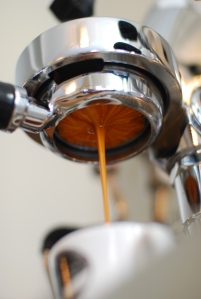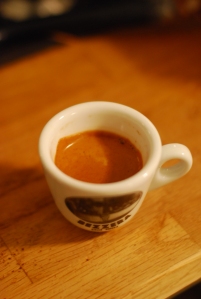Why espresso?
When done right, it’s wonderful. An elevating experience that dazzles the senses, and clarifies the mind.
Your taste buds dance. Your nose sings along. And the magical elixir sends you soaring. The caffeine boost helps, too.
That’s why I love it.
For me, it’s the ultimate and purest expression of what coffee can be. It takes a simple bean, unlocks everything it has to offer, and rewards you with something special.
But wait a minute. How many people actually feel this way?
I suspect espresso may be the most misunderstood of all coffee brewing methods. And this leads to many misconceptions:
“Yuck, it’s so bitter!”
“That’s just too strong for me!”
“I’ll never sleep!”
“That’s it? The cup is so small – one sip and I’ll be done!”
“Espresso is only for Europeans or coffee snobs!”
I’ll address all of the above in future posts. But I assure you, these common misconceptions are exactly that – misconceptions. And this doesn’t have to be the case.
Outside of Italy, where it’s a national institution – and pockets of the world where the Italian export has taken hold – the art of espresso pulling is frequently the domain of baristas, specialty cafés, roasteries, and enthusiasts.
It’s true, big commercial chains have adopted the concentrated beverage, but most offerings bear little resemblance to real espresso. They’re loaded with sugar and unhealthy additives, and buried under vat-sized quantities of milk. And if this brand of espresso is served straight, it’s often “bitter”, “strong”, and generally a negative experience.
The big challenge is that espresso brewing requires myriad variables to be ‘just right’, or everything goes very wrong. It’s more science than art, although great baristas are artists in their own right. The bottom line is…without strict attention to detail, and the necessary expertise to do it right – and make it taste good – it’s understandable why these negative feelings about espresso take root.
These bad experiences then reinforce common misconceptions. And compounded over time, negative connotations about espresso persist, snowball, and become established beliefs.
Have no fear! I’m confident this is slowly changing, as specialty cafés spread and consumer demand increases for higher quality coffee. Still, the level of interest in espresso and craft coffee lags behind the modern cultural explosion sparked by, for example, foodies, wine connoisseurs, craft beer aficionados, and whiskey collectors. The list of specialty and culinary pursuits goes on, and on.
Overall, while consumer demand for quality espresso remains a niche pursuit, I think it’s safe to say the trend is upward. I expect demand will continue to grow. And once people discover this rewarding, magical beverage, the genie will be out of the bottle. And you won’t be able to put that little cup down!
Cheers!
Canuck Coffee Guy
☕CCG☕




Very well Put! Thanks.
LikeLike
Cheers!
LikeLike
No question espresso is misunderstood in North America especially. One of the more frustrating things for me is to see a cafe with excellent equipment pump out junk espresso due to either untrained baristas or old/inferior beans. At the end of the day, their product satisfies the majority of their clients who are just looking for a “high end” Starbucks or Dunkin Donuts clone with tons of milk, and overpowering syrups.
Personally I question if straight espresso will ever become mainstream in the US and Canada, which is probably the reason why most Americans who love espresso make it at home. Odds are, if you put in the time, you’ll get a better product than the coffee shop down the street (unless you live in a hip city).
LikeLiked by 1 person
Things are slowly changing, especially in major cities. In Toronto, where I work, more specialty cafés are popping up all the time. Most people are ordering milk based espresso drinks. But the fact that they’re willing to line up for a barista crafted beverage, at a higher cost than the big chains, shows they value the quality difference. This still makes up a fraction of the overall coffee marketplace. But the trend is certainly in the right direction!
LikeLike
Thanks for checking out the blog, Btw!
LikeLike